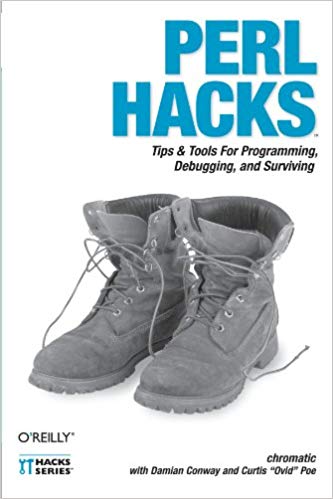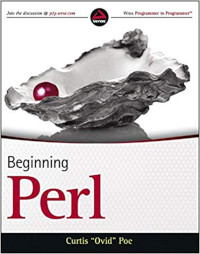Introduction
I’ve written before about why you want immutable objects, but sometimes that’s too restrictive. For example, if you’re writing a caching class, having an immutable cache may not be what you want.
This, it turns out, is relevant to the Corinna :writer discussion being had on the Perl 5 Porter’s mailing list.
A Simple Mutable Class
For many cases, a cache can be immutable. Maybe I need to read a list of data from the database and cache that, and the underlying list doesn’t change. Fine. However, there’s one type of cache which pretty much has to be mutable. For cache replacement policies, the least recently used approach is easy to implement. You simply eject the least recently used items from the cache. This approach is not viable if cache hits are uniform, but if you have a subset of data much more likely to be needed than others, it’s a good approach. So let’s look at a basic example.
class Cache::LRU;
use Hash::Ordered;
field $cache = Hash::Ordered->new;
field $max_size :param :reader = 20;
method set( $key, $value ) {
# new values in front
$cache->unshift( $key, $value );
if ( $cache->keys > $max_size ) {
$cache->pop;
}
}
method get($key) {
return unless $cache->exists($key);
my $value = $cache->get($key);
# most recently used, so put it at the front
$cache->unshift( $key, $value );
return $value;
}
The above ensures that any time you get or set something, you push it to the
head of the ordered hash since it’s the most-recently used. It’s fairly simple
and illustrates some of the most common features of the Perl programming
language’s new class syntax.
But that’s just a tiny example. It is not production-ready for large systems.
For example, if you discover there are too many cache misses, you might want to
increase the $max_size.
Conversely, if you discover the cache is taking too much memory, you might want
to decrease the $max_size.
In a weird scenario, you might want to set $max_size to zero to effectively
disable the cache, allowing it to be a effectively be a no-op in your code, but
not having to change the rest of the code. So maybe we need a :writer
attribute:
field $max_size = :param :reader :writer = 20;
And that’s when Chris Prather surprised everyone—including me—by suggesting
that we don’t want to support :writer at
all !
I’m very sympathetic to Chris' point of view, though I suspect we’ll get
:writer after all.
Before we dig in, let’s talk again about objects and encapsulation.
Encapsulation
Many people say that encapsulation is about hiding the data of the instance.
However, this is not correct. It’s about hiding data and behavior.
Externally, classes should present as small a contract as possible. Internally,
however, that might hide quite a bit of complexity. While our Cache::LRU class
example is simple, it still shows how the data, $max_size, interacts with the
maximum number of entries we hold in our cache. The cache might hold less than
that and it’s fine, but it shouldn’t hold more than that.
However, even for simple data classes with little to no behavior, this
encapsulation is easy to get wrong. For example, if we add a :writer
for $max_size, what is the return value of $cache->set_max_size(10)? Some
argue that it should be the previous value of $max_size. So let’s look at
that:
class UserAccount;
use Data::Printer;
field $username :param :reader;
field $password :param :writer;
# more code here
method _data_printer () {
return {
username => $username,
password => '<redacted>';
};
}
In the above, I can create a UserAccount object to some other bit of code and
it cannot read the password. For debugging, they can dump the object with
Data::Printer , but still can’t see the
password.
And then someone does this:
my $old_password = $user_account->set_password('Ha!');
save($old_password);
$user_account->set_password($old_password);
Now someone has managed to grab and save the old password from my “secure”
object. Returning the old value of the field violates encapsulation and pretty
much ruins the point of the UserAccount class.
So encapsulation is easy to get wrong, but if the writer doesn’t return the old value, we’re good, right?
Adding a :writer to our cache
Here we’ve added the :writer attribute to the Cache::LRU cache. Our goals
are:
- Increase the max size to decrease cache misses
- Decrease the max size to decrease memory usage
- Set max size to zero to disable caching
class Cache::LRU;
use Hash::Ordered;
field $cache = Hash::Ordered->new;
field $max_size :param :reader :writer = 20;
method set( $key, $value ) {
# new values in front
$cache->unshift( $key, $value );
if ( $cache->keys > $max_size ) {
$cache->pop;
}
}
method get($key) {
return unless $cache->exists($key);
my $value = $cache->get($key);
# most recently used, so put it at the front
$cache->unshift( $key, $value );
return $value;
}
Do you see the bug? Or bugs? Think about it a moment before we move on.
Of course you saw the bug. This is a simple example. We’ve exposed state, but not behavior, and the encapsulation violation makes our code more fragile, when classes should make our code less fragile. So what do we have?
- Increasing cache size works
- Decreasing cache size doesn’t
Keep in mind that this is a simple example. In real-world code, classes are often large and complex, with weird little lines of code addressing issues maintenance programmers might not know about. They’re easy to get wrong if designed poorly (trust me, I’ve designed plenty of awful classes).
In this case, we have a bad set method:
method set( $key, $value ) {
# new values in front
$cache->unshift( $key, $value );
if ( $cache->keys > $max_size ) {
$cache->pop;
}
}
We only pop a single value off the cache if the cache is too big when we set the
cache. So if we have twenty entries in our cache and we set $max_size to 10,
it will never drop below twenty entries. So the hapless maintenance programmer
writes this:
method set( $key, $value ) {
# new values in front
$cache->unshift( $key, $value );
$cache->pop while $cache->keys > $max_size;
}
Looks better, right? Think about our use case here. We’re decreasing cache size
due to excessive memory consumption. However, our cache isn’t resized until the
next time we call set and if that’s infrequent, we might have to wait a
while until the size of the cache is reduced.
Worse, because data validation isn’t (yet) handled in attributes, we can now get
an infinite loop when we call set() if someone does
$cache->set_max_size(-1).
So let’s fix that:
class Cache::LRU;
use Hash::Ordered;
use Types::Common::Numeric qw(assert_PositiveOrZeroInt);
field $cache = Hash::Ordered->new;
field $max_size :param :reader = 20;
method set_max_size($size) {
assert_PositiveOrZeroInt($size);
$max_size = $size;
$self->constrain_class_size;
}
method set( $key, $value ) {
# new values in front
$cache->unshift( $key, $value );
$self->constrain_class_size;
}
# Note: the :private attribute is not yet implemented.
# You probably want to use _constrain_class_size as a
# temporary work-around
method contrain_class_size :private {
if ( !$max_size ) {
# special case for performance
$cache = Hash::Ordered->new;
}
else {
# this can be slow for large caches
$cache->pop while $cache->keys > $max_size;
}
}
method get($key) {
return unless $cache->exists($key);
my $value = $cache->get($key);
# most recently used, so put it at the front
$cache->unshift( $key, $value );
return $value;
}
By removing the :writer and creating the method manually, we can have the
class properly properly address the fact that state and behavior must be handled
at the same time.
MooseX::Extended
This approach is powerful enough that my
MooseX::Extended module makes all
attributes private by default. However, since the values are mutable, we’ll use
the special is => 'rwp' syntax stolen from
Moo . From the docs:
rwpstands for “read-write protected” and generates a reader likero, but also sets writer to_set_${attribute_name}for attributes that are designed to be written from inside of the class, but read-only from outside.
The LRU cache might thus be written like this (untested):
package Cache::LRU;
use MooseX::Extended
types => 'PositiveOrZeroInt',
includes => 'method';
use Hash::Ordered;
param max_size => (
is => 'rwp',
isa => PositiveOrZeroInt,
default => sub {20},
);
field _cache => (
is => 'rwp',
default => sub { Hash::Ordered->new },
);
method set_max_size($size) {
$self->_set_max_size($size);
$self->_constrain_class_size;
}
method set( $key, $value ) {
# new values in front
$cache->unshift( $key, $value );
$self->_constrain_class_size;
}
method _contrain_class_size :private {
my $max_size = $self->max_size;
if ( !$max_size ) {
# special case for performance
$self->_set__cache(Hash::Ordered->new);
}
else {
# this can be slow for large caches
my $cache = $self->_cache;
$cache->pop while $cache->keys > $max_size;
}
}
method get($key) {
my $cache = $self->_cache;
return unless $cache->exists($key);
my $value = $cache->get($key);
# most recently used, so put it at the front
$cache->unshift( $key, $value );
return $value;
}
So that’s a bit cleaner than Moose or Moo, but a bit clumsier than the new
class syntax, but ensures that set_max_size handles both state and behavior.
Conclusion
My great aunt Catherine passed away in a mental institution before I was born. Seems she was a mathematician, but that’s not why she was in a mental institution. It’s because she was an addict. She passed away because her doctor, in their infinite wisdom, decided Catherine needed to quit cold turkey. Her body couldn’t handle the withdrawals.
OK, that’s a pretty brutal and grossly unfair setup for an analogy. I’ll run with it.
OOP developers are so addicted to the idea of mutable objects and unused to the
idea that state and behavior are often tightly coupled, that they’re going to
insist upon :writer. It will take years to wean them off it. So making them
press the :writer lever to get their hit is a compromise.
And I’m pretty sure I’ll be pressing that lever too, from time to time. Maybe for personal use it’s not so bad, but think twice before taking a hit in a professional environment.
Side note: I also find that I often don’t use :reader attributes with
Corinna, either. Why I don’t is an exercise for the reader (heh).


